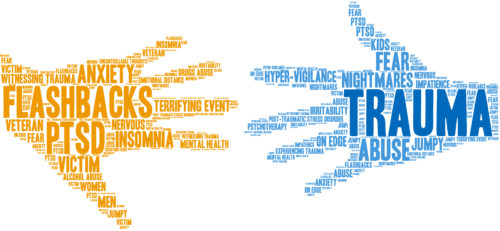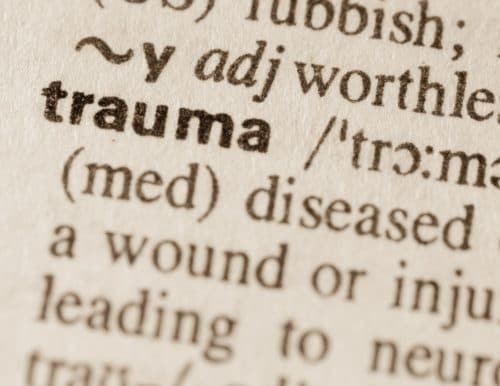 Post-traumatic stress disorder (PTSD) is a mental health condition that results from your body’s reaction to a traumatic event. Many people experience traumatic events that result in symptoms such as nightmares, flashbacks, and intense anxiety. These will usually subside in less than one month. But if symptoms persist for longer and begin to affect your daily functioning, you may be struggling with PTSD. However, with proper treatment and self-care, these symptoms can be reduced in intensity or even completely eliminated.
Post-traumatic stress disorder (PTSD) is a mental health condition that results from your body’s reaction to a traumatic event. Many people experience traumatic events that result in symptoms such as nightmares, flashbacks, and intense anxiety. These will usually subside in less than one month. But if symptoms persist for longer and begin to affect your daily functioning, you may be struggling with PTSD. However, with proper treatment and self-care, these symptoms can be reduced in intensity or even completely eliminated.
What Is The Difference Between Acute Stress Disorder and Posttraumatic Stress Disorder?
The main difference between Acute Stress Disorder (ASD) and Post-traumatic Stress Disorder (PTSD) is that symptoms of PTSD persist for more than one month. The symptoms of ASD and PTSD are the same, but PTSD refers to long-term or chronic trauma.
Symptoms of PTSD
Intrusive Symptoms – These are recurrent, involuntary distressing memories, dreams, thoughts, and/or flashbacks, of the traumatic event, and intense and prolonged emotional distress caused by internal and/or external cues that resemble the traumatic event.
Avoidance – Continuous and frequent efforts to avoid internal cues associated with the traumatic event such as thoughts, feelings, and distressing memories, and similar efforts to avoid external cues that resemble the traumatic event, such as people, places, and things.
Negative Changes in Cognition – “Changes in cognition” refers to difficulties in recalling important parts of the traumatic event (i.e., dissociative amnesia), persistent negative thoughts about oneself and the world we live in that appear after the traumatic event and distorted thoughts and beliefs about the reasons for the traumatic event and its consequences. People may also experience dissociative symptoms in addition to the other changes in cognition. These include depersonalization and derealization. Depersonalization is a persistent feeling of observing oneself and one’s thoughts from outside the body. Derealization is a persistent feeling of being detached from the world as if it is a cartoon or dream-like state.
Negative Changes in Mood – The phrase “changes in mood” refers to persistent negative moods such as guilt, shame, or depression, and a persistent inability to experience positive emotions such as happiness and love. Changes in mood can also include reduced and/or lack of interest/desire to participate in activities, feeling alone and misunderstood, or feeling estranged from others.
Arousal Symptoms – These are changes in reactivity to internal and/or external cues that are associated with or resemble the traumatic event such as hypervigilance, and being easily startled.
Other symptoms that develop after traumatic events include irritable behavior, inappropriate angry outbursts, reckless and/or self-destructive behavior, difficulties concentrating, and sleeping.
 Causes of PTSD
Causes of PTSD
PTSD has a direct relationship with our survival instincts, in other words, “Fight or Flight.” During a traumatic event, our nervous system triggers the release of different hormones as the body begins to prepare to fight or flee. As a result, the traumatic event rewires the brain and nervous system. Individuals who directly experience or witness a traumatic event, experience changes in their biological and physiological responses. The extent of these changes varies. It is believed that one’s “hardiness” can reduce symptom intensity, along with good social support. The causes of PTSD are still being studied.
Treatments for PTSD
The most effective treatment for most mental health disorders is a combination of psychotropic medication (e.g., antidepressants) and psychotherapy. Medication will reduce symptom intensity. Psychotherapy helps the patient process the event, alter beliefs about the event, and learn skills to manage and reduce symptoms. It can include Cognitive-Behavior Therapy (CBT), Dialectical Behavior Therapy (DBT), Eye Movement Desensitization and Reprocessing (EMDR), and Exposure therapy. You should seek therapeutic treatment from someone who specializes in trauma. Group therapy involves meeting others who have similar experiences and helps counter feelings of isolation and estrangement.
In addition to medication and psychotherapy, social support and self-care can help you cope with the symptoms of PTSD. These include yoga, meditation, self-soothing, journaling, learning a new skill/hobby, and distraction techniques.
Contact us today to schedule a complimentary 15-minute phone consultation or to book an appointment.

